By continuing to browse the site you are agreeing to our use of cookies. Find out more in our Privacy Policy.
Our quick and easy free test will give you an overview of your personality, and show you how you can find out much more. To complete your free test, just answer each of the questions by choosing one option that’s most like you, and one that’s least like you.
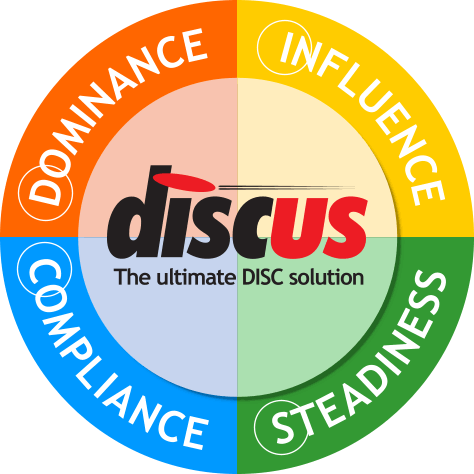
To complete a question, choose one answer from the 'Most like me' column, and one from the 'Least like me' column.
The DISC personality test lies at the heart of Discus. It uses a simple test like the one above to measure key features of the personality, and from those results we can interpret a whole range of a person's likely behaviors. In this section we've answered some of the most common questions about Discus and the DISC assessment it uses.
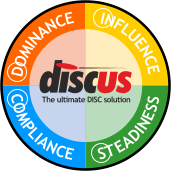
DISC assessment is designed to measure a series of key personality factors with a direct bearing on a person's working style and atttitude. Once a person has completed a DISC test, those core factors can be used to provide an understanding at many different levels. DISC can provide a simple overview of a personal style, but it can also be applied to to much more specific areas of work, or even particular kinds of task.
What's more, if you have results for more than one individual, it's possible to assess those results together, and so explore working relationships and even entire teams.
Based on a simple test like the one on this page, the DISC assessment measures a set of four key personality factors: Dominance, Influence, Steadiness and Compliance. Taken singly or in combination, these four factors can describe a person's most relevant and fundamental attitudes to issues such as authority, sociability, reliability and self-reliance.
The DISC assessment measures of each of these four factors independently, and it's in the interplay between the four within a personality that we can find the details of a person's behavioral tendencies and motivations.
The DISC test is designed to measure four fundamental personality factors. It is from the initials of these four factors that the DISC profiling system takes its name. These four fundamental factors are:
Each of these four factors can have its own independent level within a personality, and they ways that they interact with one another provide vital information about an individual. We can describe these interactions using DISC sub-traits, which relate high and low factors to provide a whole extra dimension of analysis. For example, the sub-trait of Co-operativeness combines Compliance and Dominance to describe how ready a person will be to fit within the norms of a group. There are multiple subfactors like this, each taking the DISC assessment to a new level of detail.
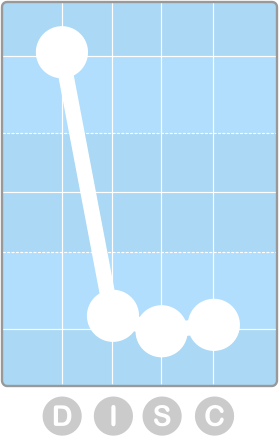
A DISC graph is simply a graphical representation of the four main DISC factors in a personality. From left to right, the graph shows Dominance, Influence, Steadiness and Compliance (labeled simply D, I, S and C for convenience). The four factors are connected by lines, so that each different personality type has a distinct and recognisable graph shape.
In fact, a full DISC assessment will not produce a single graph, but a series of them, each based on different combinations of test responses to describe the personality under different conditions. By comparing these different graphs and their values, we can see how a person will tend to adapt their approach to suit different conditions.
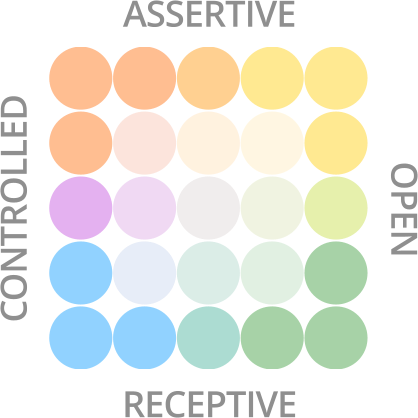
A Style Card is a simple alternative to a DISC graph that compresses all four DISC factors down to a single point on a grid. Naturally, this graphic carries rather less information than a full DISC graph, but its advantage is in providing an at-a-glance view of a DISC personality style. Different colors are used on the grid to represent different personality styles.
There are various ways to do this, but the simplest is to use an automated 'invitation' system which handles the entire testing process from beginning to end. This works by sending an e-mail invitation to a candidate which directs them in turn to an online questionnaire. The questionnaire is completed online, and once the answers are received, they can be compiled automatically to create a DISC profile. The results of that test are then immediately available to be viewed or analyzed as needed.
Though online invitations are the easiest way to manage a test, they're not the only option. It's also possible, for example, to create printed questionnaires, and then enter the results into a DISC system. After the results of the questionnaire entered, once again the entire marking and calculation process is automated, and the results are immediately ready to view.
Because the factors measured by a DISC assessment are fundamental to the personality, a very large range of reporting options are available. As well as a general description of a personality, it's also possible to look at more specific topics in detail. To take some common examples, a DISC report can look at issues like communication, organization, motivation and decision making. It's also possible to examine more specific questions, such as suitability for certain kinds of roles (and indeed the specialist Job Match report can describe how well a candidate matches the precise personality needs of any job or role).
Beyond this, multiple additional reports and formats are available. For example, it's possible to produce a Feedback Report suitable for the candidate to read about their own results, or to create a set of behavioral interview questions tailored to a particular personality type. Even more specific reporting options are also provided, covering topics such as a deep invesigation of motivational factors, or the way a person will act when working remotely.
This depends to some extent on the individual, but for most candidates, the DISC test (consisting of twenty-four questions) will take about ten minutes to complete.
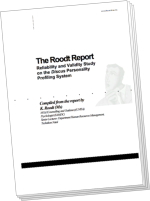
There's a full reliability and validity study available for DISC, and specifically for the Discus profiler. This assessment is contained in the independent study A Reliability and Validity Study on the Discus Personality Profiling System (or, less formally, the Roodt Report after its author, psychologist Karin Roodt of Technikon Natal in South Africa).
This is a real DISC test, but naturally, being free, the results we can provide are fairly limited, while hopefully still providing some useful insights. We'll give you a selecton of comments providing an overview of your personal style, as well as a Style Card to represent your personality graphically.
That's not all, however. You'll also have the opportunity to explore your results in a great deal more detail using by activating a free Discus account. If you do that, we'll automatically add the results of your free test into your new account, so you'll have access to the full array of reporting options provided by Discus.
Yes, you can. Discus includes a feature that allows you to set up your own logo and color scheme for all your candidate-facing content. That means that your can maintain your corporate branding throughout the process, and when a candidate is completing a questionnaire or reading a report, they'll see your branding on the screen.
